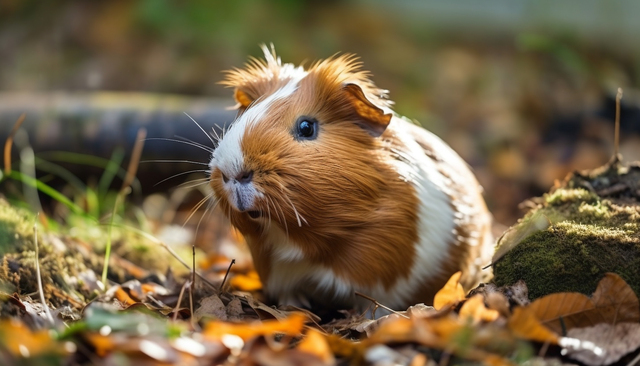How Long Do Guinea Pigs Live? Ensuring Your Pet Lives Long
Ever wondered about the life expectancy of our fluffy pals, the guinea pigs? Well, as a longtime guinea pig enthusiast and advisor, I’ve had my fair share of experiences, both joyous and heartbreaking. Let’s delve into the fascinating world of guinea pig lifespans and answer the question: “How long do guinea pigs live?”
The Average Lifespan of a Guinea Pig
While guinea pigs, also known as cavies, have an average lifespan of 4 to 8 years, this figure is an average, and numerous factors can affect this number. It’s crucial to understand these variables to optimize your guinea pig’s life.
Genetics:
Just like humans, a guinea pig’s genetics play a significant role in determining how long they will live. If a guinea pig comes from a lineage with robust health and longevity, it’s more likely to enjoy a longer life. It’s always a good idea to inquire about the health of the parents or previous generations when adopting a new cavy.
Diet:
Proper nutrition is essential. A balanced diet consisting of high-quality guinea pig pellets, unlimited timothy hay, and fresh fruits and vegetables can promote health and longevity. On the flip side, an imbalanced or deficient diet can lead to health issues, which can shorten their lifespan. For example, apples can be a great snack for guinea pigs, but shouldn’t be their main diet. This goes for many other vegetable and fruits as well, such as grapes.
Care:
Regular grooming, especially for long-haired breeds, and maintaining clean living conditions can drastically improve a guinea pig’s quality of life. Neglecting these basics can lead to infections and other health problems that may reduce their lifespan.
Environment:
Guinea pigs are sensitive to their environment. They thrive in stable climates — not too cold or hot — and need protection from drafts, direct sunlight, and predators. A stressful environment can lower their immunity and make them more prone to diseases.
Mental Health:
Believe it or not, guinea pigs can get depressed. Loneliness, lack of stimulation, or a sudden change in their environment can negatively impact their mental well-being, which in turn affects their overall health. Engaging toys, companionship, and regular playtime can keep their spirits high.
Regular Health Checks:
Just as we humans need periodic health screenings, so do guinea pigs. Regular check-ups by a veterinarian can catch potential health problems early on, ensuring they receive timely treatment.
Providing Proper Care for Longevity
When answering the question “How long do guinea pigs live?”, proper care is what matters most. If you want your furry friend to be with you for the long haul, consider the following:
A Nutritious Diet:
Just as in humans, the foundation of good health for guinea pigs lies in what they consume.
High-Quality Pellets: Ensure the pellets are specifically designed for guinea pigs. They contain Vitamin C, essential for guinea pigs as they cannot produce it on their own.
Fresh Hay: Timothy hay should be readily available. It aids in digestion and keeps their teeth in check. Hay should be the mainstay of their diet, ensuring they get the required fiber.
Vegetables & Fruits: Fresh veggies like bell peppers, cucumbers, and leafy greens can be given daily. Fruits, rich in sugar, should be occasional treats. Remember, moderation is key.
Regular Vet Check-ups:
Regular health assessments are pivotal.
Routine Check-ups: Even if your guinea pig appears healthy, annual visits can catch potential issues before they become major problems.
Emergencies: Be vigilant about sudden behavioral or dietary changes, which can indicate health issues.
Safe and Spacious Habitat:
The quality of their living conditions directly influences their health and lifespan.
Cage Size: Ensure the cage is spacious enough for them to move, play, and exercise. A cage for a single guinea pig should be at least 7.5 square feet, but bigger is always better.
Cleanliness: Regular cleaning prevents bacterial buildup. A daily spot clean to remove droppings and uneaten food, combined with a weekly deep clean, is recommended.
Bedding: Use comfortable, absorbent, and non-toxic bedding. Change it regularly to keep the habitat dry and odor-free.
Hydration:
Always ensure your guinea pig has access to fresh and clean water. A hanging water bottle is ideal as it prevents contamination.
Companionship:
Guinea pigs are social animals. Consider having more than one to prevent loneliness, ensuring they have company of their own kind. Ensure proper introductions to prevent territorial disputes.
Environmental Enrichment:
Stimulate their minds and bodies.
Toys: Wooden chews, tunnels, and balls can entertain them and cater to their natural behaviors.
Exercise: Outside-of-cage time in a secure playpen or a safe indoor space is essential for physical fitness.
Grooming:
Depending on the guinea pig breed, the guinea pigs may require regular grooming.
Long-haired breeds: Brushing them daily helps prevent mats and tangles.
Nail Trimming: Their nails can become overgrown. Regular trimming, either at home or by a professional, is essential.
By ensuring each of these elements is addressed, you pave the way for your guinea pig to lead a long, happy, and fulfilling life. Remember, the key is consistent, attentive, and knowledgeable care. Your guinea pig relies on you to provide the best for them, and with the right care, they can thrive.
Social Life: Why Companionship Matters
In the wild, guinea pigs are highly social animals. They live in groups, known as herds, and rely on each other for various aspects of their life, from foraging for food to looking out for predators. This social nature doesn’t just vanish when they become our pets.
Benefits of Companionship:
Emotional Well-being: Much like humans, guinea pigs need emotional connections to thrive. A companion offers comfort, interaction, and stimulation, all of which are pivotal for their mental well-being.
Physical Activity: With a fellow guinea pig to play and interact with, they’re more likely to be active. This activity can range from playful chases to gentle grooming sessions, all of which contribute to their overall health.
Communication: Guinea pigs communicate with a variety of sounds, from wheeks and purrs to rumbles. Having a companion allows them to engage in these natural vocalizations, fostering a richer communicative environment.
Learning through Observation: Often, when one guinea pig learns something new, like using a particular toy or navigating a part of their habitat, the other follows suit. This mutual learning process can be especially helpful in introducing new items or routines.
Considerations for Introducing Companionship:
The Right Introduction: While guinea pigs are sociable, introductions should be handled with care. Introduce them on neutral grounds initially, monitor their interactions, and look out for signs of aggression.
Space Matters: If you’re adding a new guinea pig to the mix, ensure the habitat is spacious enough for both. Cramped spaces can lead to territorial disputes.
Same-sex Pairs: If you’re not planning on breeding, it’s a good idea to get same-sex pairs to prevent unexpected litters.
Regular Monitoring: Even after successful introductions, continue to monitor their relationship. Like all relationships, there can be ups and downs, and it’s essential to ensure both are safe and happy.
The Emotional Impact of Loneliness:
Guinea pigs that live alone can experience loneliness, leading to depression. Symptoms may include less activity, reduced vocalizations, and a lack of interest in things they once enjoyed. It’s not just about having a companion but also about the quality of companionship.
Keeping Them Active and Engaged
1. The Power of Play:
Toys: Offer a variety of toys tailored to guinea pigs, like wooden chews, wicker balls, and puzzle toys. These can keep them occupied and also aid in dental health by wearing down their teeth.
Tunnels and Hideouts: Guinea pigs love to explore and hide. Providing them with tunnels or hideouts can make their environment more engaging. These can be store-bought or homemade.
2. Exploration Time:
Outside-the-Cage: Allow your guinea pigs supervised time outside of their cage in a secure environment. This change of scenery is stimulating and provides an opportunity for them to explore and exercise.
Safe Enclosures: If you have a garden, set up a secure outdoor enclosure where they can graze on fresh grass and enjoy the environment, ensuring there are no harmful plants or potential predators.
3. Training and Interaction:
Teach Simple Commands: With patience, guinea pigs can be taught basic commands using positive reinforcement. This not only stimulates their mind but also strengthens the bond between you and your pet.
Hand-Feeding: Occasionally hand-feed treats or fresh vegetables. This interactive feeding can be a form of engagement and build trust.
4. Companionship:
Playmates: As naturally social animals, having a companion can keep a guinea pig engaged. They’ll interact, communicate, and play together, which is beneficial for their emotional well-being.
5. Rotating Toys and Accessories:
Variety is Key: Just like humans, guinea pigs can get bored with the same toys. Rotate toys and accessories every week to ensure they always have something “new” to engage with.
6. Sensory Stimulation:
Different Textures: Introduce a range of textures in their environment, from soft bedding to crunchy tunnels.
Sounds: While loud noises can be stressful, soft, calming sounds or gentle music can be soothing and engaging for them.
7. Foraging Opportunities:
Hide Treats: Guinea pigs have a natural instinct to forage. Hide small treats or their favorite vegetables in their bedding or toys, encouraging them to search and find them.
Foraging Toys: There are specific toys available that mimic the foraging process. They require the guinea pig to think and work a bit to get their treat.
8. Physical Activity:
Ramps and Platforms: If your cage design allows, integrate ramps or platforms that require climbing, adding another layer of physical activity.
Exercise Balls: While not all guinea pigs may take to them, some enjoy rolling around in specially designed exercise balls. Always ensure they’re the correct size and supervise usage.
Common Health Issues in Guinea Pigs & How to Avoid Them
Awareness of these issues can be a game-changer:
1. Scurvy (Vitamin C Deficiency):
Description: Guinea pigs cannot produce their own vitamin C and thus rely entirely on their diet. A deficiency can lead to scurvy.
Symptoms: Lethargy, joint swelling, difficulty walking, and weight loss.
Prevention/Treatment: Ensure a well-balanced diet with high-quality guinea pig pellets and fresh fruits and vegetables rich in vitamin C.
2. Respiratory Infections:
Description: Caused by bacteria, these infections can be life-threatening if not treated.
Symptoms: Difficulty breathing, discharge from the nose or eyes, sneezing, and lethargy.
Prevention/Treatment: Maintain clean living conditions, avoid drafts, and seek veterinary care at the first sign of symptoms.
3. Dental Issues:
Description: Guinea pigs’ teeth grow continuously. Improper alignment or inadequate wear can cause overgrowth and other dental problems.
Symptoms: Drooling, difficulty eating, weight loss, and swollen jaws.
Prevention/Treatment: Provide a diet high in fibrous foods like hay to ensure natural wear and have regular dental check-ups with a vet.
4. Parasitic Infestations:
Description: Mites and lice can infest guinea pigs, causing discomfort and health issues.
Symptoms: Scratching, hair loss, scabs, and dandruff-like flakes.
Prevention/Treatment: Regular grooming, keeping the living environment clean, and consulting a vet for appropriate treatments.
5. Bloat:
Description: A severe condition where the stomach or intestines fill with gas.
Symptoms: A visibly swollen abdomen, refusal to eat or move, and signs of pain.
Prevention/Treatment: Monitor diet to prevent gassy foods, and seek immediate veterinary care if bloat is suspected.
6. Urinary Issues:
Description: Guinea pigs can develop stones in their urinary tract or suffer from infections.
Symptoms: Blood in urine, difficulty urinating, or frequent urination.
Prevention/Treatment: Provide a diet low in calcium and ensure fresh water is always available. Consult a vet for diagnosis and treatment.
7. Pododermatitis (Bumblefoot):
Description: An infection in the footpad, often due to abrasive or unclean cage surfaces.
Symptoms: Swelling, redness, and lameness in one or more feet.
Prevention/Treatment: Ensure a clean cage with soft bedding and seek veterinary treatment for established infections.
8. Heat Stroke:
Description: Guinea pigs are sensitive to high temperatures and can suffer from heatstroke.
Symptoms: Panting, lethargy, and unresponsiveness.
Prevention/Treatment: Always provide a cool environment, especially during hot months. If signs of heatstroke appear, move the guinea pig to a cool place and consult a vet immediately.
How Long Do Guinea Pigs Live Conclusion
Answering the question “How long do guinea pigs live?”: The average lifespan of a guinea pig is 4-8 years. A guinea pigs lifespan can be extended with proper care and diet. For those considering getting a guinea pig as a pet, we encourage you to also understand how much it costs to own a guinea pig.
The years might seem fleeting, but with proper care, understanding, and endless love, we can ensure our guinea pigs lead a full and vibrant life.
How Long Do Guinea Pigs Live? FAQ
How can I tell if my guinea pig is sick?
Look for changes in behavior, eating habits, or unusual discharges.
Is it okay for guinea pigs to live alone?
It’s preferable for them to have a companion. They thrive better socially.
How often should I clean their cage?
Ideally, a spot clean daily and a thorough clean weekly.
What are the best foods for guinea pigs?
Fresh hay, leafy greens, and quality pellets should be staples.
Do guinea pigs need vaccinations?
No, but regular vet visits are crucial to monitor their health.




